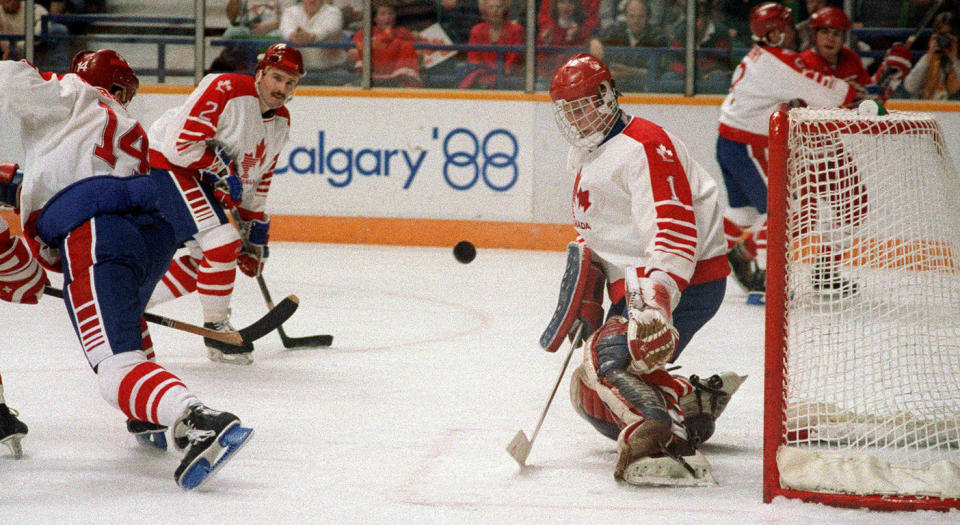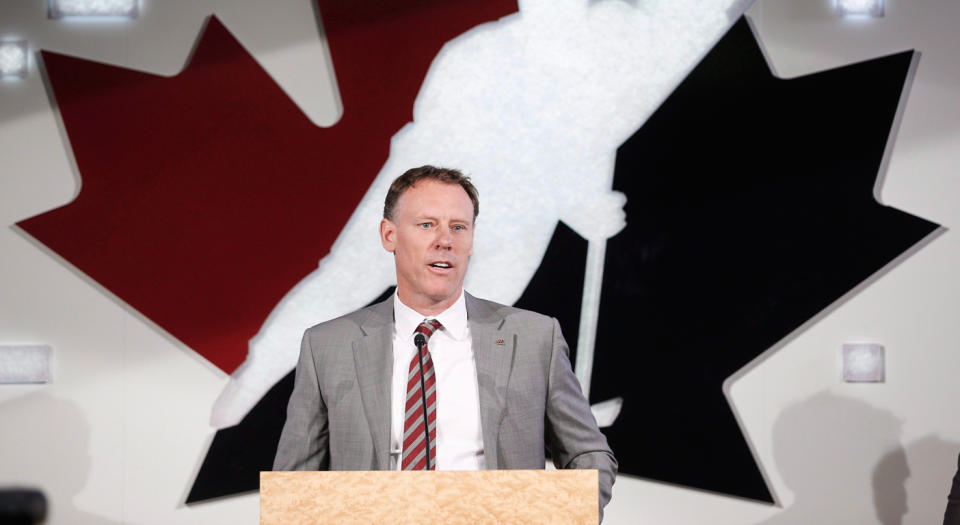Q&A with the hardest worker in hockey: Canadian Olympic GM Sean Burke

If there’s a busier person in hockey, they probably haven’t met Sean Burke.
On top of his scouting duties with the Montreal Canadiens, the former Olympian is in charge of the Hockey Canada braintrust actively scouring the globe for talent in an effort to assemble a team that’s worthy of defending Canada’s back-to-back gold won by NHL talent at the two previous Olympics.
With less than two months before Pyeongchang, and while waiting to board a flight to Moscow (a fitting location, for sure), we caught up with Burke to discuss his Olympic journey, which began more than three decades ago when he became a member of the Canadian National Team, and how that experience lends itself to the tremendous challenge he accepted last summer.
Justin Cuthbert: Let’s start from the beginning. You first joined the Canadian National Team in 1985-86, after being drafted into the NHL. What made you choose that route?
Sean Burke: It was really a decision by the (New Jersey) Devils. They decided I would develop better and a lot quicker if I was with the National Team rather than going back for another season of junior. It was great foresight. A real big part of my development as a young player was playing for Dave King. It wasn’t the traditional way to develop a player but it was an option, and it was a good one.
What was the regime back then for a National Team member?
You definitely couldn’t get away with it in the NHL. The CBA wouldn’t allow for the amount of work we put in those days. It was a great system because sometimes you had two weeks between tournaments or games. There was a lot of practice time. We practiced twice a day, a lot of off-ice training, a lot of education. You learned a lot as a young guy. We had VO2 testing a few times a year to make sure we were all in top condition. And we had a lot of high-competition games with the Russians, Czechs, Swedes and Finns. A lot of the teams we played had the best players in the world outside of the NHL, because a lot of them hadn’t come over yet.
Given that all your energy and efforts were put toward the Olympics in Calgary, I imagine the pressure you put on yourselves was incredibly high. But the pressure from outside the locker room, how would that compare to what the players may have felt in Vancouver and Sochi?
There was a lot of internal pressure. The Olympics were in Canada. We had beat the Russians in Moscow a couple months before, but knew we weren’t necessarily the better team. They were going to come into Calgary wanting revenge for that game and get back at us. We obviously felt the pressure of playing in front of home fans, but I guess when you’re young like that you don’t really think of it in those terms. The focus, the preparation – that was the most important lesson we got in those days. You’re not always going to be the better team, but if you’re prepared and in top shape, you’ll give yourself a chance. That was important for me at an early age.
Were you able to fly under the radar?
We didn’t get a lot of attention until it came time for the Olympics. But we played in a lot of top tournaments, played NHL teams in preseason and usually beat most of them. We had a collection of really good players that weren’t necessarily going to have great NHL careers, but the team was well constructed. We had a lot of quick guys, fit guys. We flew under the radar maybe in terms of publicity, but we played a lot of good teams. The competition always took us very seriously, that’s for sure.
How many games did you play in the Calgary games, and were you satisfied with how you performed?
I don’t remember exactly. I know I played the Russian game, and we got beat 5-0. We lost to the Finns. We didn’t medal, coming fourth. I guess that wasn’t satisfying, but I think as a young player I thought I had performed well. The Russians were such a good team in those days, with all the best players that hadn’t come to the NHL yet. Looking back I think you appreciate it more, but you’re never satisfied unless you win. I don’t remember the feeling at the time, but I’m sure I wasn’t overly ecstatic with not getting a medal at those Games.

You ever think you would be involved in the Olympics again?
No, probably not. I was onto the NHL right away. Right after the Olympics, three or four days later, I went to New Jersey and started my NHL career. When ‘92 came around, I wasn’t playing very well in New Jersey. I lost a little bit of my game, and enthusiasm, and I needed something different. The Olympics were coming around again so I took a year and left, went back and did it again. It was one of the better things I had done in my career, to be honest.
What changed in terms of perception and pressure when you returned to the National Team?
I had a real appreciation for how much I enjoyed it. I needed to get my game back, but also felt there was some unfinished business. I was going back as a veteran. I had a different role, and in my mind I had different expectations. I felt like we had a chance to win a gold medal and I knew I would play a big role in that. I had a lot of positive feelings about going back the second time to play.
The first Olympic tournament that I really remember was in 2002, and the 50-year narrative that surrounded that team. When you were preparing for Albertville, did the 40-year narrative exist?
Not really. It was different. I don’t remember a lot from 1992 other than going in with a really good feeling, knew I had a role, and that I could have a really big impact at the Olympics. It was focus on what we had to do, not on what was being said or what was going on out there.
I read that you made sure to appreciate being an Olympian the second time. What did you learn, or take away from the second run?
I went back to the NHL a much different player. I had much more of an appreciation of how great the opportunity was to play in the Olympics, but also to be a pro. You’re young and emotional, and go through some roller-coaster moments. I just felt I went back after that with contentment, knowing where I was going. I had confidence in myself as a player. I had played in two Olympics and I was only 25. I felt like now I could go into the NHL and wouldn’t have to ride that roller coaster, and the highs and lows. I appreciated that I was doing something that I love doing. You better enjoy it if you think you’re going to do it for any length of time. I went on to last 18 or 19 years in the league. Those Olympic experiences were what made me enjoy the game that much.
Did you dwell on the result?
Not really, but I never watched the game. We were 0-0 after two periods. When you’re in a gold medal game you don’t win the silver, you lose the gold. It’s very disappointing when that game ends, even when you’re standing there, receiving a silver medal in the Olympics. It’s a pretty nice achievement, but it’s hard to think that way when you lose the gold medal. You gain perspective on it as the years go by.

Fast forward to now and Hockey Canada has given you perhaps the greatest challenge that anyone in your seat has ever had. Has the process of putting together this national team been at all daunting?
I wouldn’t say it’s been daunting. I’m surrounded by really good people. We have a really good management team. I know at the end of the day, while it may look like one guy is picking the team, that’s not the case. Myself, Scott Salmond, Tom Renney, our coaching staff has worked extremely hard. Willie Desjardins, Dave King, Scott Walker and Craig Woodcroft are great hockey guys. If you’re surrounded with people like that, it’s not daunting. It’s a challenge, but I have a really good team with me that can get it done.
You once appeared in 43 games and 2500 minutes one season for the National Team. The team you select for Pyeongchang will only have a handful of games together, if that. How much of concern is this?
It would be more of a concern if it wasn’t the same for everybody. Obviously the Russians and some of the European teams play with each other more, so that’s a challenge for us. But I think we’ve had a really good schedule. We have seen all of our players multiple times, and we’ll see them again a couple more times. It’s not ideal – that would be the word – but that’s all part of the challenge. That makes it even more interesting, seeing how this team will come together.
What sort of style do you want to deploy in Pyeongchang?
I think every Canadian team wants to play the same. You want to play an aggressive, controlled game, where you’re not sitting back. You’re coming out physical within the discipline that you need to have at those kind of tournaments. We want to be a quick team that pressures, but a lot of that will depend on our personnel. But the intensity and work rate that Canada usually plays with will be part of our culture.
Looking at the past GMs for Hockey Canada at the Olympics. It obviously involves scouting and managerial experience, and being a decorated former national team member seems like a requirement. But is there something to be said, too, for familiarity first hand and experience specific to the situation?
I think it helps. I think I can put myself in the shoes of a lot of these players. This opportunity is not something these guys ever thought about. It’s going to be a highlight of most of these guys’ careers. There’s a pressure and expectation that goes with that. I was in that position a few times and understand it. The international game, the format, and enjoying being a part of the bigger team – Team Canada; there’s a lot that goes into an Olympics and I’ve had the opportunity to be at a couple of them. That doesn’t help you with scouting, or putting the best players on the ice. But I think once you get there, that experience can play a factor.
Are you viewing this challenge as a proving ground for a potential next job?
I haven’t even thought about a next potential job. I haven’t had the time. It is a real honour for me, and I said when I got the job that I wasn’t going to do anything but focus on what I have to do – try to do the best I could. That’s been the way I’ve approached it, and I don’t see that changing. Whatever is down the line – who knows? But it can’t change the approach right now. There’s too much work to do, and it’s too enjoyable right now to worry about what’s coming next.
More Hockey coverage on Yahoo Sports:

 Yahoo Sports
Yahoo Sports 

